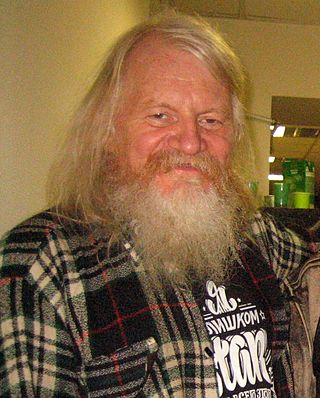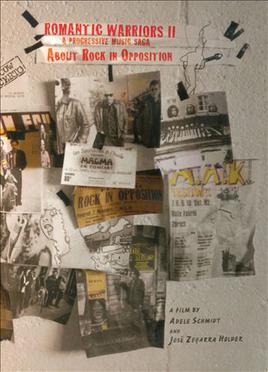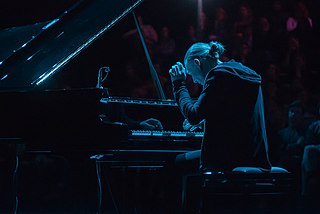Related Research Articles
Progressive rock is a broad genre of rock music that developed in the United Kingdom and United States through the mid- to late 1960s, peaking in the early 1970s. Initially termed "progressive pop", the style was an outgrowth of psychedelic bands who abandoned standard pop traditions in favour of instrumentation and compositional techniques more frequently associated with jazz, folk, or classical music. Additional elements contributed to its "progressive" label: lyrics were more poetic, technology was harnessed for new sounds, music approached the condition of "art", and the studio, rather than the stage, became the focus of musical activity, which often involved creating music for listening rather than dancing.
Progressive metal is a broad fusion music genre melding heavy metal and progressive rock, combining the loud "aggression" and amplified guitar-driven sound of the former with the more experimental, cerebral or "pseudo-classical" compositions of the latter.

Rock in Opposition or RIO was a movement representing a collective of progressive bands in the late 1970s united in their opposition to the music industry that refused to recognise their music. It was initiated by English avant-rock group Henry Cow in March 1978 when they invited four mainland European groups to come to London and perform in a festival called "Rock in Opposition".

Samla Mammas Manna was a Swedish progressive rock band often characterized by virtuosic musicianship, circus references and silly humour, similar in many ways to the song-writing style of Frank Zappa. They were one of the founding members of the Rock in Opposition (RIO) movement in the late 1970s. In 1979 they were Fred Frith's backing band on his solo album, Gravity (1980). Musically, they bore a resemblance to the Canterbury scene.

Rock music was originated in the Soviet Union in the 1960s under the influence of Western rock music and bard songs and developed due to both amateur bands and official VIA.
Armenian rock describes a wide variety of forms of rock music made in Armenia or by artists of Armenian descent.

Hidria Spacefolk is a Finnish progressive / psychedelic rock / space rock band. The group's sound is often compared to Kingston Wall and Ozric Tentacles. The band describes their musical style as Astro-Beat. They use many different instruments such as the cello, violin, flute, didgeridoo, marimba, mandolin, sitar and vibraphone.

Fear of a Blank Planet is the ninth studio album by British progressive rock band Porcupine Tree and their best selling before 2009's The Incident. It was released on 16 April 2007 in the UK and the rest of Europe by Roadrunner, 24 April 2007 in the United States by Atlantic, 25 April 2007 in Japan by WHD, and 1 May 2007 in Canada by WEA. Steven Wilson has mentioned that the album's title is a direct reference to the 1990 Public Enemy album Fear of a Black Planet; while the former tackled race issues, the latter is about the fear of losing the current generation of youth to various common threats to their mental and social wellbeing, including broken homes, excessive "screen time", and narcotic overuse to the point of mental and spiritual "blankness".

Aleksander Kostarev is a Russian progressive rock musician. He began his musical career in the 1970s, but did not garner popular recognition until the 2000s when he became one of the most important artists of the Russian progressive rock scene.
Disen Gage is a Russian rock band from Moscow.
Olive Mess is a progressive rock band from Latvia singing in English, one of the most famous Baltic progressive rock bands.
This is a timeline of artists, albums, and events in progressive rock and its subgenres. This article contains the timeline for the period 1990 - 1999.
This is a timeline of artists, albums, and events in progressive rock and its subgenres. This article contains the timeline for the period 2000 - 2009.

Romantic Warriors II: A Progressive Music Saga About Rock in Opposition is a 2012 feature-length documentary film about the Rock in Opposition movement of the late 1970s, the music genre it spawned, and the influence it has on experimental groups across the world. The film was written and directed by Adele Schmidt and José Zegarra Holder, and was released in the United States by Zeitgeist Media. It premiered in Washington, D.C. on September 28, 2012. The film was generally well received by critics, with a reviewer at AllMusic saying that it "covers all the points an aficionado could possibly want".

Sergey Kalugin is a Russian acoustic guitarist, singer-songwriter and poet, the leader of the Russian art/progressive rock band Orgia Pravednikov. Kalugin's guitar mastery combines classical and rock guitar trends, his music covers such different genres as progressive rock, Baroque music, flamenco; his poetics deals with such themes as Hermeticism, Kabbalah, vampirism, Christian esoterism, Gnosticism, Buddhism etc., and also includes some satirical component.
Hamster Theatre is an American avant-rock, experimental and folk jazz music group based in Boulder, Colorado, and led by composer and multi-instrumentalist Dave Willey. They have released three albums, and have performed at several festivals, including Progman Cometh and ProgDay.

Romantic Warriors: A Progressive Music Saga is a feature-length documentary film written and directed by Adele Schmidt and José Zegarra Holder, released in 2010 as the first part of a series dedicated to progressive rock as an artistic, cultural and social phenomenon. The project reflects the film makers' love of a music genre that has made a strong comeback in the early 21st century – four decades after its Seventies heyday – although without regaining the commercial appeal of the original movement. Romantic Warriors was positively received by long-time followers of the genre, and sparked interest also outside the boundaries of the progressive rock fandom.

Gleb Kolyadin is a Russian pianist, composer, and arranger who mixes progressive rock and jazz fusion with neoclassical styles. He has released music both as a solo artist and as a member of the prog duo iamthemorning.

Musea Records is a French non-profit recording company founded in 1985 by Francis Grosse and Bernard Gueffier in Dombasle-sur-Meurthe, specialising in progressive rock. Musea also acts as a distributor for associated smaller labels and operates an online shop. "Musea" is an obsolete plural form of "museums", aptly representing the catalogue of artists and bands published and produced. In 1996, Musea Records moved its business headquarters to Metz.